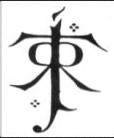Forum
Welcome Guest |
|
|---|---|
 Author Author |
Topic: |
|---|
| Anarerulasto |
|
||||||||
| Malinornë |
|
||||||||
| Lambengolmo |
|
||||||||
| jaredmoreau |
|
||||||||
| TheIstarMithrandir |
|
||||||||
| Lambengolmo |
|
||||||||
| Lex |
|
||||||||
| Lambengolmo |
|
||||||||
| Lambengolmo |
|
||||||||
| Lex |
|
||||||||
| Members Online |









 pronouncing "ny"
pronouncing "ny" ). Like in nyarna "tale, account".
). Like in nyarna "tale, account".
 ). Ex: melinyel "i love you" (mel- [verb] + -i- [as a connecting vowel] + -nyë [subject pronominal ending "i"] + -l [object pronominal ending "you").
). Ex: melinyel "i love you" (mel- [verb] + -i- [as a connecting vowel] + -nyë [subject pronominal ending "i"] + -l [object pronominal ending "you").